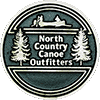The wilderness making up the BWCA and Quetico Park is considered a lakeland situation, not a series of rivers. Where travel takes a paddler on one of our major rivers (the Kawishiwi and Isabella in the BWCA, and Quetico’s Maligne River and “Fall’s Chain”), the impression is more of a long narrow lake versus a flowing river. The lesser rivers, such as the Horse, Nina-Moose, Indian Sioux, normally have a slow flow and not much volume. Between some connecting lakes, and interspersed along our rivers, are a few rapids or small falls. Only a handful of these would be of any interest to a “kayaker” or “river runner”.
Running rapids here in the north country is bad practice and here’s why:
There is a high probability for ending up in the water if not done correctly. Rarely does this, in itself, present a hazard to the paddler. (While there have been a few drownings, in these cases each of these individuals were not wearing their life jackets.) But from a materialistic point of view, packs get soaked, sleeping bags are soggy, tents are wet, and food is ruined. Hundreds of fishing rods and tackle boxes have ended up on the bottom. These occurrences can really be a negative impact on the success of a canoe trip, and can be very expensive.
A drive down Ely’s main street will take you past several outfitting companies. In front of some of them, you can see bent and folded canoes. Each is accompanied by a sign telling of some customer that tried to run a set of rapids and ended up destroying the canoe. Here at North Country, we, too, have several canoes that have cost customers hundreds of dollars in additional costs to pay for their lack of good judgment. Each of these people were specifically warned to STAY OUT OF RAPIDS and to ALWAYS USE THE PORTAGES. Yet most had some excuse as to why an additional charge of $500 to $1500 shouldn’t be charged to their Visa credit card. “It didn’t look that hard” or “The other two canoes got through OK” or “Isn’t that covered by equipment insurance?” (NO!)
Unlike paddling the rivers in Nebraska, Ohio, Missouri, or Arkansas, if there is a problem, there is “no farm house just over the hill to call from”. Here in the canoe country, a wrecked canoe means the trip stops right there. The only way out is to wait for some other paddler to come by (a few hours or maybe the next day), and talk them into changing their plans to give one of you a ride out. (Canoes don’t hold four people.)
In short, if you want to insist on shooting rapids along your trip, or even if you think you might be tempted to “give it a try” on one of the small ones … do us a big favor:
USE ANOTHER OUTFITTER!
